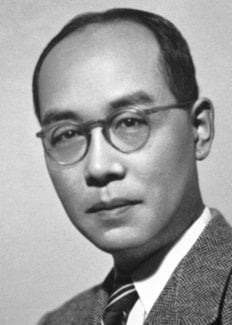Hideki Yukawa
Biographical

Hideki Yukawa was born in Tokyo, Japan, on 23rd January, 1907, the third son of Takuji Ogawa, who later became Professor of Geology at Kyoto University. The future Laureate was brought up in Kyoto and graduated from the local university in 1929. Since that time he has been engaged on investigations in theoretical physics, particularly in the theory of elementary particles.
Between 1932 and 1939 he was a lecturer at the Kyoto University and lecturer and Assistant Professor at the Osaka University. Yukawa gained the D.Sc. degree in 1938 and from the following year he has been, and still is, Professor of Theoretical Physics at Kyoto University. While at Osaka University, in 1935, he published a paper entitled “On the Interaction of Elementary Particles. I.” (Proc. Phys.-Math. Soc. Japan, 17, p. 48), in which he proposed a new field theory of nuclear forces and predicted the existence of the meson. Encouraged by the discovery by American physicists of one type of meson in cosmic rays, in 1937, he devoted himself to the development of the meson theory, on the basis of his original idea. Since 1947 he has been working mainly on the general theory of elementary particles in connection with the concept of the “non-local” field.
Yukawa was invited as Visiting Professor to the Institute for Advanced Study at Princeton, U.S.A., in 1948, and since July, 1949 he has been Visiting Professor at Columbia University, New York City.
The learned societies of his native land have recognised his ability and he is a member of the Japan Academy, the Physical Society and the Science Council of Japan, and is Emeritus Professor of Osaka University. As Director of the Research Institute for Fundamental Physics in Kyoto University he has his office in the Yukawa Hall, which is named after him. He is also a Foreign Associate of the American National Academy of Sciences and a Fellow of the American Physical Society.
The Imperial Prize of the Japan Academy was awarded to Yukawa in 1940; he received the Decoration of Cultural Merit in 1943, and the crowning award, the Nobel Prize for Physics, in 1949.
A large number of scientific papers have been published by him and many books, including Introduction to Quantum Mechanics (1946) and Introduction to the Theory of Elementary Particles (1948), both in Japanese, have come from his pen. He has edited a journal in English, Progress of Theoretical Physics, since 1946.
An honorary doctorate of the University of Paris and honorary memberships of the Royal Society of Edinburgh, the Indian Academy of Sciences, the International Academy of Philosophy and Sciences, and the Pontificia Academia Scientiarum have marked the recognition he has earned in world scientific circles.
A civic honour was awarded to him when he was created Honorary Citizen of the City of Kyoto, Japan.
In 1932 he married, and he and his wife Sumiko have two sons, Harumi and Takaaki.
This autobiography/biography was written at the time of the award and first published in the book series Les Prix Nobel. It was later edited and republished in Nobel Lectures. To cite this document, always state the source as shown above.
Hideki Yukawa died on September 8, 1981.
Nobel Prizes and laureates
Six prizes were awarded for achievements that have conferred the greatest benefit to humankind. The 12 laureates' work and discoveries range from proteins' structures and machine learning to fighting for a world free of nuclear weapons.
See them all presented here.
